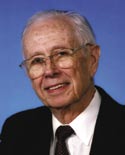
During his almost 60 years with the Johns Hopkins’ Applied Physics Laboratory (APL), Alexander Kossiakoff ’38 PhD, fondly known as “Kossy,” set an astounding pace. He was a pioneer of solid propellant rocket technology, a builder of satellites and radar systems, an academic innovator, a mentor, and APL director for 11 years.
Up until a few weeks before his death of congestive heart failure on August 6, the 91-year-old was still coming to work daily as APL’s chief scientist, a post he had held for the past 25 years. Kossiakoff also had still served as program chair for technical management and systems engineering in the Whiting School of Engineering’s Engineering and Applied Science Programs for Professionals (EPP). He also guided these part-time programs through their rapid growth.
After joining APL as a young missile scientist in 1946, Kossiakoff contributed “enormously to national security by developing— from drawing board to deployment— the first fleet-wide naval guided missile systems,” noted Hopkins President William R. Brody. Two years later, Kossiakoff became APL’s assistant director, and then its director (1969-80).
Born in St. Petersburg, Russia, Kossiakoff earned his undergraduate degree at CalTech and his doctorate at Hopkins, both in chemistry. He was “universally known as a man of great intelligence, skill, vision, and humanity,” noted Brody, who presented him with the Johns Hopkins President’s Metal in 2004. His numerous other honors included the Department of Defense Medal for Distinguished Public Service, its highest honor for an individual from outside the government. APL named its Kossiakoff Conference and Education Center in his honor in 1983.
Survivors include his wife of 66 years, Arabelle; a daughter, a son, and five granddaughters. APL plans to hold a memorial service this fall.
The family has requested that memorial donations be directed to the Whiting School’s Systems Engineering Programs, 144 New Engineering Building, 3400 N. Charles St., Baltimore, MD 21218.




